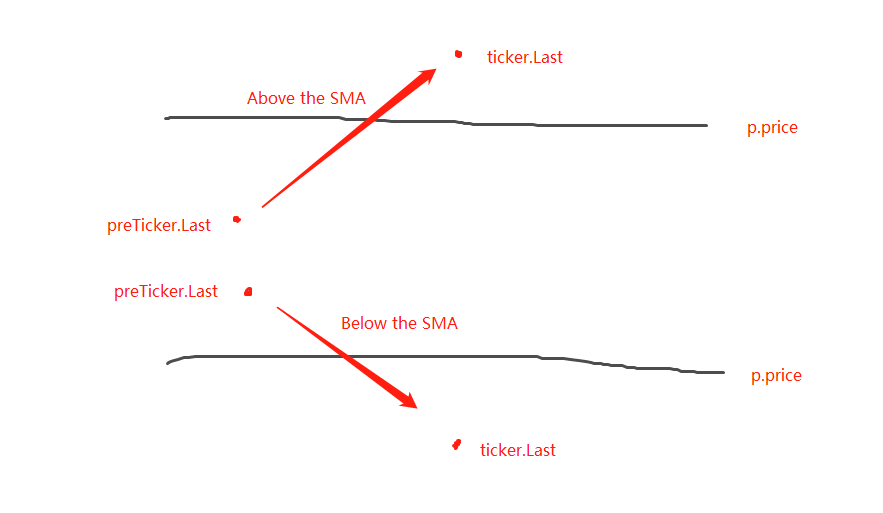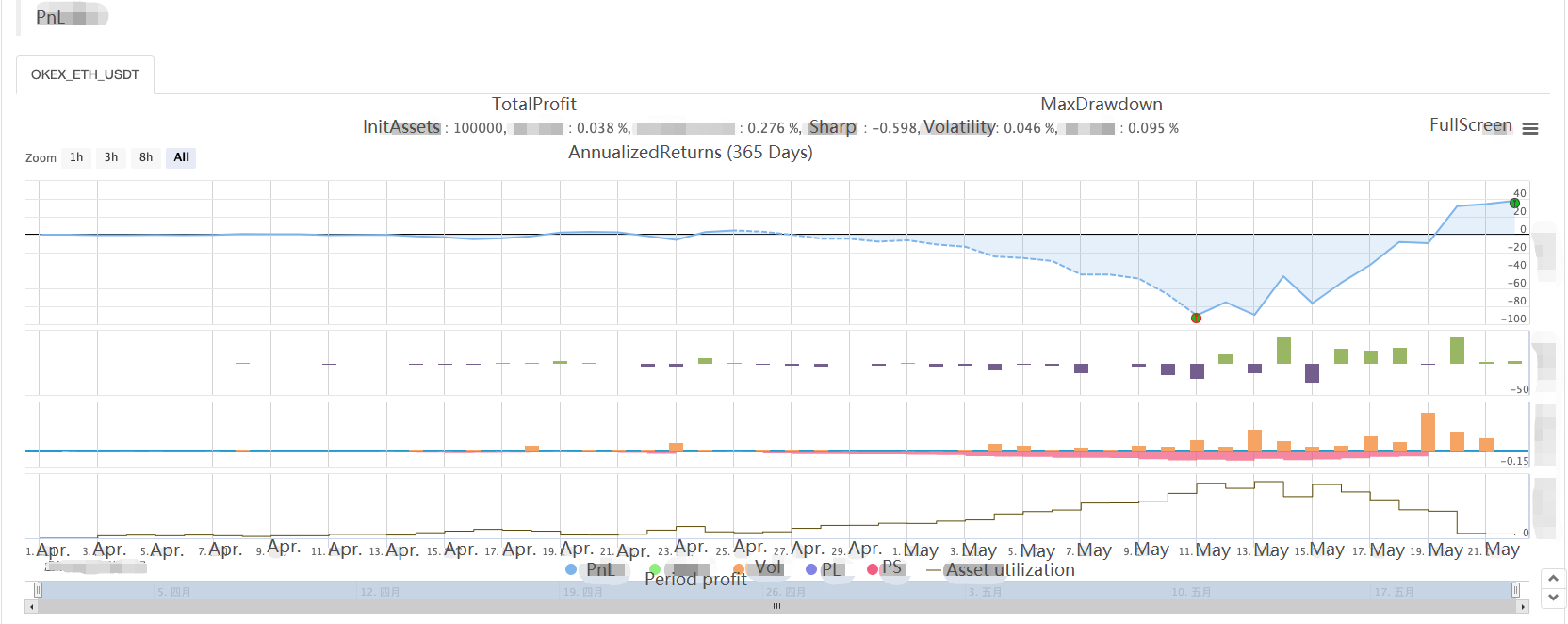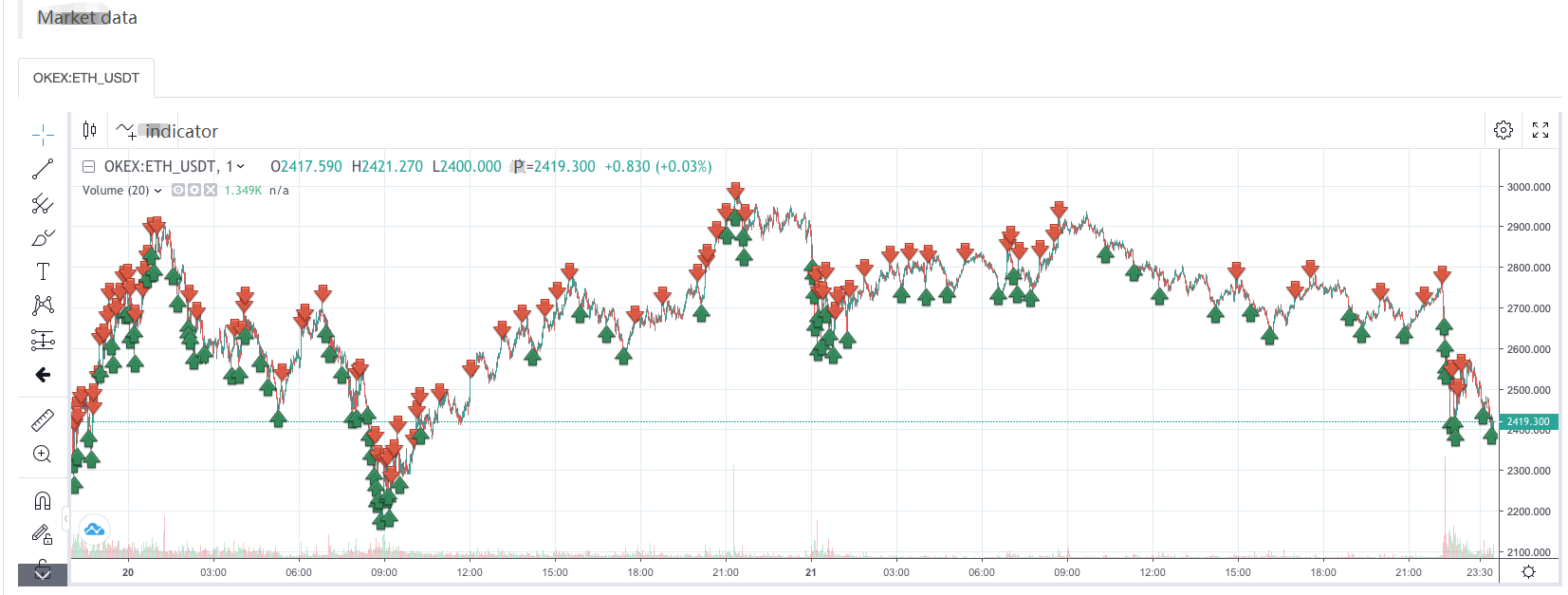ابتدائیوں کے لئے کریپٹوکرنسی مقداری تجارت - آپ کو کریپٹوکرنسی مقداری کے قریب لے جا رہا ہے (5)
مصنف:FMZ~Lydia, تخلیق: 2022-08-03 16:08:50, تازہ کاری: 2023-09-21 21:07:02
پچھلے مضمون میں ، ہم نے ایک سادہ گرڈ حکمت عملی کے تجارتی منطق تجزیہ کی وضاحت کی۔ اس مضمون میں ، ہم اس ٹیوٹوریل حکمت عملی کے ڈیزائن کو مکمل کرتے رہیں گے۔
-
تجارتی منطق کا تجزیہ جیسا کہ ہم نے پچھلے مضمون میں ذکر کیا ہے ، آپ ہر گرڈ لائن کو عبور کرکے اور موجودہ قیمت کو اوپر یا نیچے عبور کرنے کا فیصلہ کرکے تجارتی عمل کو متحرک کرسکتے ہیں۔ لیکن حقیقت میں ، ابھی بھی بہت ساری منطقی تفصیلات موجود ہیں ، اور ابتدائی لوگ جو حکمت عملی لکھنے کو نہیں سمجھتے ہیں وہ اکثر غلط فہمی کا شکار ہوتے ہیں کہ
منطق بہت آسان ہے ، کوڈ میں صرف چند لائنیں ہونی چاہئیں ، لیکن اصل تحریر میں ابھی بھی بہت ساری تفصیلات ملتی ہیں۔ پہلی تفصیل جس پر ہمیں غور کرنا ہے وہ ہے لامحدود گرڈ کا ڈیزائن۔ کیا آپ کو یاد ہے کہ ہم نے ایک فنکشن ڈیزائن کیا ہے
createNetپچھلے مضمون میں مل کر ابتدائی گرڈ ڈیٹا ڈھانچہ پیدا کرنے کے لئے؟ یہ فنکشن گرڈ ڈیٹا ڈھانچہ تیار کرتا ہے جس میں گرڈ لائنوں کی ایک محدود تعداد ہوتی ہے۔ تو کیا ہوگا اگر حکمت عملی چل رہی ہے تو قیمت اس گرڈ ڈیٹا ڈھانچے کی حدود سے باہر جاتی ہے (اوپر گرڈ لائن سے آگے جہاں قیمت سب سے زیادہ ہے ، اور نیچے گرڈ لائن جہاں قیمت سب سے کم ہے) ؟ تو ہمیں پہلے گرڈ ڈیٹا ڈھانچے میں ایک توسیع میکانزم شامل کرنے کی ضرورت ہے۔آئیے اسٹریٹجی مین فنکشن لکھنا شروع کرتے ہیں، جو کہ وہ کوڈ ہے جہاں اسٹریٹجی کا عملدرآمد شروع ہوتا ہے۔
var diff = 50 // Global variables and grid spacing can be designed as parameters for easy explanation. We write this parameter into the code. function main() { // After the real bot starts running, execute the strategy code from here var ticker = _C(exchange.GetTicker) // To get the latest market data ticker, please refer to the FMZ API documentation for the structure of the ticker data: https://www.fmz.com/api#ticker var net = createNet(ticker.Last, diff) // The function we designed in the previous article to construct the grid data structure initially, here we construct a grid data structure net while (true) { // Then the program logic enters this while infinite loop, and the strategy execution will continue to execute the code within the {} symbol here. ticker = _C(exchange.GetTicker) // The first line of the infinite loop code section, get the latest market data and update it to the ticker variable // Check the grid range while (ticker.Last >= net[net.length - 1].price) { net.push({ buy : false, sell : false, price : net[net.length - 1].price + diff, }) } while (ticker.Last <= net[0].price) { var price = net[0].price - diff if (price <= 0) { break } net.unshift({ buy : false, sell : false, price : price, }) } // There are other codes... } }گرڈ ڈیٹا ڈھانچے کو توسیع پذیر بنانے کے لئے یہ کوڈ ہے (اوپر والے کوڈ سے اقتباس):
// Check the grid range while (ticker.Last >= net[net.length - 1].price) { // If the price exceeds the grid line of the highest price of the grid net.push({ // Just add a new grid line after the grid line with the highest price of the grid buy : false, // Initialize sell marker sell : false, // Initialize buy marker price : net[net.length - 1].price + diff, // dd a grid spacing to the previous highest price }) } while (ticker.Last <= net[0].price) { // If the price is lower than the grid line of the lowest price of the grid var price = net[0].price - diff // Different from adding upwards, it should be noted that the price of adding new grid lines downwards cannot be less than or equal to 0, so it is necessary to judge here if (price <= 0) { // Less than or equal to 0 will not be added, jump out of this loop break } net.unshift({ // Add a new grid line just before the grid line with the lowest price of the grid buy : false, sell : false, price : price, }) }اگلا مرحلہ یہ ہے کہ تجارتی ٹرگر کو خاص طور پر کیسے لاگو کیا جائے۔
var diff = 50 var amount = 0.002 // Add a global variable, which can also be designed as a parameter. Of course, for the sake of simplicity, we also write it in the strategy code. // This parameter controls the trade volume each time a trade is triggered on the grid line function main() { var ticker = _C(exchange.GetTicker) var net = createNet(ticker.Last, diff) var preTicker = ticker // Before the main loop (fixed loop) starts, set a variable to record the last market data while (true) { ticker = _C(exchange.GetTicker) // Check the grid range while (ticker.Last >= net[net.length - 1].price) { net.push({ buy : false, sell : false, price : net[net.length - 1].price + diff, }) } while (ticker.Last <= net[0].price) { var price = net[0].price - diff if (price <= 0) { break } net.unshift({ buy : false, sell : false, price : price, }) } // Retrieve grid for (var i = 0 ; i < net.length ; i++) { // Iterate over all grid lines in the grid data structure var p = net[i] if (preTicker.Last < p.price && ticker.Last > p.price) { // Above the SMA, sell, the current node has already traded, regardless of SELL BUY, it will no longer be traded if (i != 0) { var downP = net[i - 1] if (downP.buy) { exchange.Sell(-1, amount, ticker) downP.buy = false p.sell = false continue } } if (!p.sell && !p.buy) { exchange.Sell(-1, amount, ticker) p.sell = true } } else if (preTicker.Last > p.price && ticker.Last < p.price) { // Below the SMA, buy if (i != net.length - 1) { var upP = net[i + 1] if (upP.sell) { exchange.Buy(-1, amount * ticker.Last, ticker) upP.sell = false p.buy = false continue } } if (!p.buy && !p.sell) { exchange.Buy(-1, amount * ticker.Last, ticker) p.buy = true } } } preTicker = ticker // Record the current market data in preTicker, and in the next cycle, use it as a comparison between the "previous" market data and the latest one to judge whether to be above the SMA or below the SMA. Sleep(500) } }یہ دیکھا جا سکتا ہے کہ:
- گرڈ لائنوں کے اوپر پار کرنے کی شرط:
preTicker.Last < p.price && ticker.Last > p.price - گرڈ لائنوں کے نیچے پار کرنے کی شرط:
preTicker.Last > p.price && ticker.Last < p.price
پچھلی پوسٹ میں ہم نے یہی کہا تھا:
- گرڈ لائنوں کے اوپر پار کرنے کی شرط:

یہ فیصلہ کرنا کہ ایس ایم اے سے اوپر یا نیچے ہونا صرف پہلا قدم ہے کہ آیا آرڈر دیا جاسکتا ہے ، اور یہ بھی ضروری ہے کہ گرڈ لائن ڈیٹا میں نشانات کا فیصلہ کیا جائے۔
اگر یہ ایس ایم اے سے اوپر ہے تو ، یہ فیصلہ کیا جاتا ہے کہ قیمت موجودہ گرڈ لائن اور قریب ترین گرڈ لائن پر خرید کے نشان سے کم ہے۔ اگر خرید کے نشان کی قیمت درست ہے تو ، اس کا مطلب یہ ہے کہ پچھلی گرڈ لائن خریدی گئی ہے ، اور پچھلی خرید کے نشان کو غلط پر ری سیٹ کریں ، اور موجودہ گرڈ لائن کو غلط پر بیچنے کے نشان کو ری سیٹ کریں۔
حالات کا فیصلہ کرنے کے بعد ، اگر کوئی ٹرگر نہیں ہے تو ، فیصلہ کرنا جاری رکھیں۔ اگر موجودہ گرڈ لائن پر خرید / فروخت کے نشانات دونوں غلط ہیں تو ، اس کا مطلب یہ ہے کہ موجودہ گرڈ لائن کی تجارت کی جاسکتی ہے۔ چونکہ یہ ایس ایم اے سے اوپر ہے ، لہذا ہم یہاں فروخت کا آپریشن انجام دیں گے۔ عمل درآمد کے بعد ، موجودہ گرڈ لائن فروخت کے نشان کو درست کریں۔
پروسیسنگ منطق SMA سے نیچے ہونے کے لئے ایک ہی ہے (بائیں ابتدائیوں کے لئے یہاں سوچنے کے لئے).
مکمل حکمت عملی بیک ٹسٹنگ
backtesting کے دوران کچھ اعداد و شمار کو دیکھنے کے لئے، ایک تقریبshowTblاعداد و شمار کو ظاہر کرنے کے لئے لکھا جاتا ہے.
function showTbl(arr) {
var tbl = {
type : "table",
title : "grid",
cols : ["grid information"],
rows : []
}
var arrReverse = arr.slice(0).reverse()
_.each(arrReverse, function(ele) {
var color = ""
if (ele.buy) {
color = "#FF0000"
} else if (ele.sell) {
color = "#00FF00"
}
tbl.rows.push([JSON.stringify(ele) + color])
})
LogStatus(_D(), "\n`" + JSON.stringify(tbl) + "`", "\n account Information:", exchange.GetAccount())
}
مکمل حکمت عملی کا کوڈ:
/*backtest
start: 2021-04-01 22:00:00
end: 2021-05-22 00:00:00
period: 1d
basePeriod: 1m
exchanges: [{"eid":"OKEX","currency":"ETH_USDT","balance":100000}]
*/
var diff = 50
var amount = 0.002
function createNet(begin, diff) {
var oneSideNums = 10
var up = []
var down = []
for (var i = 0 ; i < oneSideNums ; i++) {
var upObj = {
buy : false,
sell : false,
price : begin + diff / 2 + i * diff,
}
up.push(upObj)
var j = (oneSideNums - 1) - i
var downObj = {
buy : false,
sell : false,
price : begin - diff / 2 - j * diff,
}
if (downObj.price <= 0) { // The price cannot be less than or equal to 0
continue
}
down.push(downObj)
}
return down.concat(up)
}
function showTbl(arr) {
var tbl = {
type : "table",
title : "grid",
cols : ["grid Information"],
rows : []
}
var arrReverse = arr.slice(0).reverse()
_.each(arrReverse, function(ele) {
var color = ""
if (ele.buy) {
color = "#FF0000"
} else if (ele.sell) {
color = "#00FF00"
}
tbl.rows.push([JSON.stringify(ele) + color])
})
LogStatus(_D(), "\n`" + JSON.stringify(tbl) + "`", "\n account Information:", exchange.GetAccount())
}
function main() {
var ticker = _C(exchange.GetTicker)
var net = createNet(ticker.Last, diff)
var preTicker = ticker
while (true) {
ticker = _C(exchange.GetTicker)
// Check the grid range
while (ticker.Last >= net[net.length - 1].price) {
net.push({
buy : false,
sell : false,
price : net[net.length - 1].price + diff,
})
}
while (ticker.Last <= net[0].price) {
var price = net[0].price - diff
if (price <= 0) {
break
}
net.unshift({
buy : false,
sell : false,
price : price,
})
}
// Retrieve grid
for (var i = 0 ; i < net.length ; i++) {
var p = net[i]
if (preTicker.Last < p.price && ticker.Last > p.price) { // Being above the SMA, sell, the current node has already traded, regardless of SELL BUY, it will no longer be traded
if (i != 0) {
var downP = net[i - 1]
if (downP.buy) {
exchange.Sell(-1, amount, ticker)
downP.buy = false
p.sell = false
continue
}
}
if (!p.sell && !p.buy) {
exchange.Sell(-1, amount, ticker)
p.sell = true
}
} else if (preTicker.Last > p.price && ticker.Last < p.price) { // Being below the SMA, buy
if (i != net.length - 1) {
var upP = net[i + 1]
if (upP.sell) {
exchange.Buy(-1, amount * ticker.Last, ticker)
upP.sell = false
p.buy = false
continue
}
}
if (!p.buy && !p.sell) {
exchange.Buy(-1, amount * ticker.Last, ticker)
p.buy = true
}
}
}
showTbl(net)
preTicker = ticker
Sleep(500)
}
}
حکمت عملی بیک ٹسٹنگ:



تو ہم گرڈ کی حکمت عملی کی خصوصیات دیکھ سکتے ہیں، جب ایک رجحان مارکیٹ ہے، ایک بڑا تیرتا نقصان ہو گا، اور منافع ایک غیر مستحکم مارکیٹ میں واپس آئے گا.
لہذا ، گرڈ کی حکمت عملی خطرے سے پاک نہیں ہے۔ اسپاٹ حکمت عملی اب بھی
- ڈیجیٹل کرنسیوں میں لیڈ لیگ سوٹ کا تعارف (3)
- کریپٹوکرنسی میں لیڈ لیگ اربیٹریج کا تعارف (2)
- ڈیجیٹل کرنسیوں میں لیڈ لیگ سوٹ کا تعارف ((2)
- ایف ایم زیڈ پلیٹ فارم کی بیرونی سگنل وصولی پر بحث: حکمت عملی میں بلٹ ان ایچ ٹی پی سروس کے ساتھ سگنل وصول کرنے کے لئے ایک مکمل حل
- ایف ایم زیڈ پلیٹ فارم کے بیرونی سگنل وصول کرنے کا جائزہ: حکمت عملی بلٹ میں HTTP سروس سگنل وصول کرنے کا مکمل نظام
- کریپٹوکرنسی میں لیڈ لیگ اربیٹریج کا تعارف (1)
- ڈیجیٹل کرنسی میں لیڈ لیگ سوٹ کا تعارف ((1)
- ایف ایم زیڈ پلیٹ فارم کی بیرونی سگنل وصولی پر تبادلہ خیال: توسیع شدہ اے پی آئی بمقابلہ حکمت عملی بلٹ ان HTTP سروس
- ایف ایم زیڈ پلیٹ فارم کے لئے بیرونی سگنل وصول کرنے کا جائزہ: توسیع API بمقابلہ حکمت عملی بلٹ ان HTTP سروس
- رینڈم ٹکر جنریٹر پر مبنی حکمت عملی ٹیسٹنگ کے طریقہ کار پر بحث
- بے ترتیب مارکیٹ جنریٹر پر مبنی حکمت عملی ٹیسٹنگ کے طریقوں کا جائزہ
- ڈیجیٹل کرنسی فیکٹر ماڈل
- تجارت میں اپنے آپ کو نجات دہندہ بنائیں
- کریپٹوکرنسی کے دستی فیوچر اور اسپاٹ کی ہیجنگ حکمت عملی
- کریپٹوکرنسی اسپاٹ ہیجنگ کی حکمت عملی کا ڈیزائن ((1)
- ایک مستقل توازن کی حکمت عملی جو ریچھ مارکیٹ کے نیچے آنے کے لئے موزوں ہے
- ابتدائیوں کے لئے کریپٹوکرنسی مقداری تجارت - آپ کو کریپٹوکرنسی مقداری کے قریب لے جانا (8)
- ابتدائیوں کے لئے کریپٹوکرنسی مقداری تجارت - آپ کو کریپٹوکرنسی مقداری کے قریب لے جانا (7)
- ابتدائیوں کے لئے کریپٹوکرنسی کی کوانٹیٹیو ٹریڈنگ - آپ کو کریپٹوکرنسی کی کوانٹیٹیو کے قریب لانا (6)
- FMZ کوانٹ ٹریڈنگ پلیٹ فارم کے مرکزی انٹرفیس کا جائزہ اور فن تعمیر
- کریپٹوکرنسی فیوچر کے لئے مارٹنگیل حکمت عملی ڈیزائن
- ابتدائیوں کے لئے کریپٹوکرنسی مقداری تجارت - آپ کو کریپٹوکرنسی مقداری کے قریب لے جانا (4)
- ابتدائیوں کے لئے کریپٹوکرنسی مقداری ٹریڈنگ - آپ کو کریپٹوکرنسی مقداری کے قریب لانا (3)
- ابتدائیوں کے لئے کریپٹوکرنسی مقداری تجارت - آپ کو کریپٹوکرنسی مقداری کے قریب لے جانا (2)
- ابتدائیوں کے لئے کریپٹوکرنسی مقداری تجارت - آپ کو کریپٹوکرنسی مقداری کے قریب لے جانا (1)
- کریپٹوکرنسی اسپاٹ ہیجنگ کی حکمت عملی کا ڈیزائن ((2)
- ایف ایم زیڈ پر عام پروٹوکول تک رسائی کے معاہدے کا ایک مثال
- ملٹی ایکسچینج اسپاٹ اسپریڈ آربیٹریج حکمت عملی منطق کا اشتراک
- تجارتی حکمت عملیوں کی تعمیر کے لئے نمائش ماڈیول - گہرائی میں
- حکمت عملی ڈرائنگ ڈیزائن آسان بنانے کے لئے KLineChart تقریب کا استعمال کریں
- لائن چارٹ فنکشن کا استعمال کرتے ہوئے حکمت عملی ڈرائنگ ڈیزائن کو آسان بناتا ہے